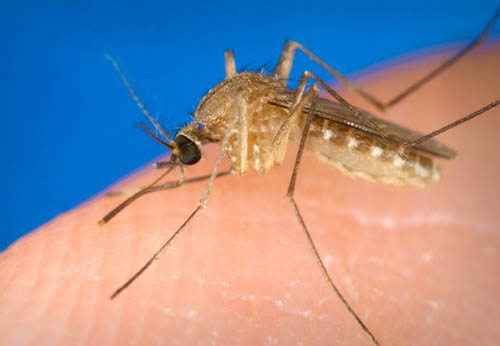Mosquito in Riverhead tests positive for West Nile virus

A mosquito sample taken in Riverhead tested positive for the West Nile Virus, Suffolk County Health Commissioner Dr. James L. Tomarken announced today.
In a press release, Dr. Tomarken said the Riverhead sample was one of 28 that tested positive from Aug. 25 through Sept. 1. The other samples were collected from Lindenhurst, West Babylon, Deer Park, South Huntington, Northport, Dix Hills, Commack, Smithtown, Nesconset, Islip, Oakdale, Holtsville, Farmingville, Setauket and Port Jefferson Station.
In addition to the mosquitoes, a bluejay found in Lake Grove also tested positive for the virus, which is transmitted to humans when an infected mosquito bites them. No humans or horses have tested positive for the virus in Suffolk County this year, Dr. Tomarken said, but a total of 127 mosquitoes and 10 birds have tested positive for it so far in 2015.
“While there is no cause for alarm, we urge residents to cooperate with us in our efforts to reduce the exposure to the virus, which can be debilitating to humans,” Dr. Tomarken said. “The breed of mosquito known as Culex pipiens-restuans lay their eggs in fresh water-filled containers, so dumping rainwater that collects in containers around your house is important.”
People infected with the West Nile virus, which was first detected in Suffolk County in 1999, generally have mild or no symptoms, but some people with the disease can develop “severe symptoms including high fever, headache, neck stiffness, stupor, disorientation, coma, tremors, convulsions, muscle weakness, vision loss, numbness and paralysis,” Dr. Tomarken said. “The symptoms may last several weeks, and neurological effects may be permanent. Individuals, especially those 50 years of age or older, or those with compromised immune systems, who are most at risk, are urged to take precautions to avoid being bitten by mosquitoes.”
To help reduce the amount of mosquitoes around your home, Dr. Tomarken suggests eliminating stagnant water, where the insects breed, by:
· Disposing of tin cans, plastic containers, ceramic pots or similar water-holding containers.
· Removing all discarded tires on the property.
· Making sure roof gutters drain properly and cleaning clogged gutters.
· Turning over plastic wading pools and wheelbarrows when not in use.
· Changing the water in birdbaths.
· Cleaning vegetation and debris from the edges of ponds and keeping shrubs and grass trimmed.
· Cleaning and chlorinating swimming pools, outdoor saunas and hot tubs.
· Draining water from pool covers.
To report mosquito problems of stagnant pools of water, call the Department of Public Works’ Vector Control Division at 631-852-4270. To report a dead bird, which may indicate the virus’ presence, call 631-787-2200. Residents are asked to take a picture of any bird in question, Dr. Tomarken said.
For more information on the West Nile virus, click here.








